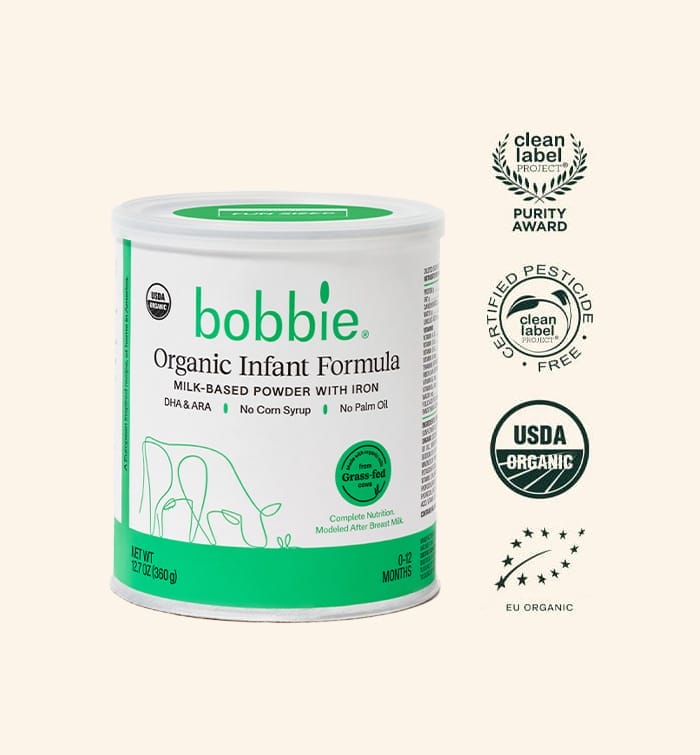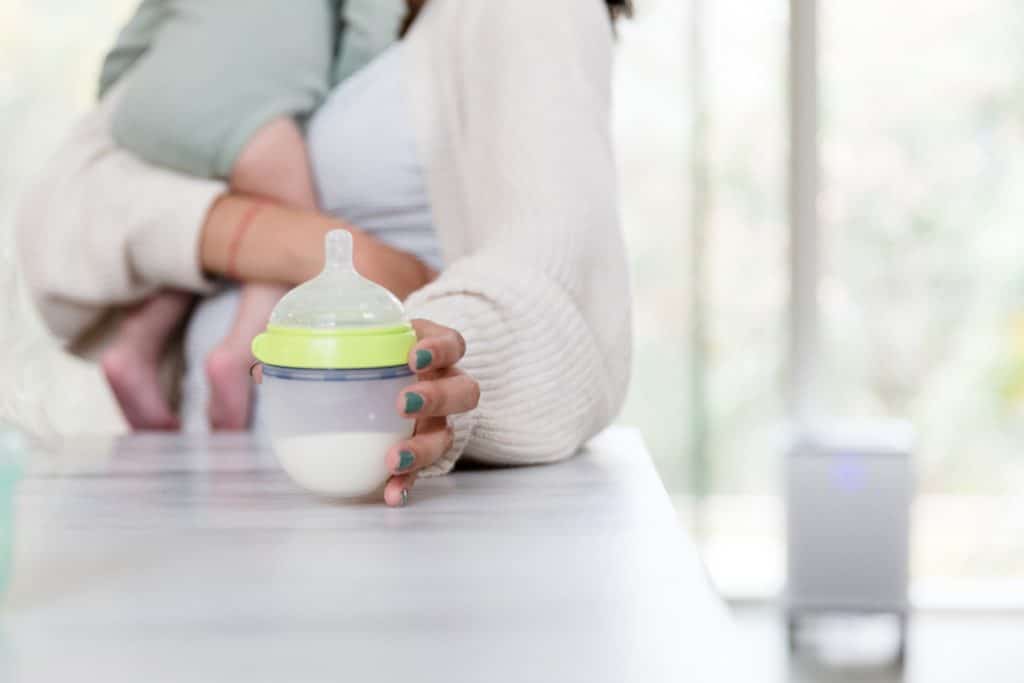We are proud to say that these posts are not sponsored. Our editorial team of Bobbie moms and writers personally select each featured product. If you buy something through our links, we may earn an affiliate commission, at no cost to you.
I remember the proud look on my husband’s face when both my daughters greedily sucked down their first servings of my pumped milk in his arms. For our family, introducing the bottle was uneventful, and I savored the freedom it allowed me to go to the movies, grab an occasional extra hour of sleep, and eventually, to return to work.
But what if your baby isn’t into bottles? Bottle refusal is surprisingly common, and can take a toll on parents who are either introducing formula in a bottle for the first time or offering pumped milk. From my sister having to drive back and forth from daycare and her office three times a day to nurse to keep her daughter’s weight up, to a mother at my baby boot camp in tears because she hadn’t been away for her son for more than an hour in the last five months, to a coworker desperately ordering 15 types of nipples looking for the holy grail that would get her son to drink, I know many who have struggled and are desperately wondering how to deal with bottle refusal.
If your baby is rejecting the bottle mama, we got you! We’ve collected expert bottle refusal tips and how to navigate through bottle rejection like a pro, and overcome bottle refusal.

Shop Bobbie Organic Infant Formula
Bobbie Organic Infant Formula is a USDA Organic, EU-style infant formula that meets all FDA requirements. It is a complete nutrition milk-based powder modeled after breast milk and is easy on tummies. It is non-GMO and doesn't have corn syrup, palm oil, or maltodextrin. Learn more about Bobbie.
5 Bottle Refusal Tips
1. Try having someone else feed your baby… or don’t.
One of the first things you hear when a mom is struggling with her baby to take a bottle is for her to leave the house while someone else feeds the baby. Definitely give this a try! But if it doesn’t work, don’t be afraid to keep trying yourself. You intuitively know your baby’s feeding cues and behaviors more than anyone else, and may be the best suited to troubleshoot the methods below.
2. Test different temperatures
Mirroring the exact temperature of your breastmilk is hard. A friend recently joked that her daughter only likes “baby lattes.” Experiment with carefully upping or dropping the temperature of the formula or milk you are serving to see what your baby likes. You can also try warming or cooling the nipple itself.
3. Try introducing the bottle at just the right time
Aka not witching hour! Picking a time of day when your baby is usually at her best temperament and hungry but not starving can help her stay relaxed and comfortable for a bottle attempt.
4. Make serving active and novel
For some babies, being in a position totally different from breastfeeding can make a big difference. Trying paced bottle feeding, having your baby face outwards, while moving around and bouncing can miraculously help some babies take a bottle (and it gives you a free workout!) A change of scene and even stepping outdoors may also help.
5. Best bottle for bottle refusal
Try a variety of the best bottle brands and nipple flows within each brand. Some babies may prefer a faster or slower flow.
FAQs on Overcoming Bottle Refusal
1. What does bottle refusal look like?
When your baby is struggling at the bottle, turning away from the bottle, fussing at the bottle, and struggling to latch on to the bottle but latches onto the breast with no issue, it might be bottle refusal. Babies who are refusing a bottle may only eat when they’re sleepy or distracted, and will go long hours between feedings.

2. How long does bottle refusal last?
Once you implement the techniques above and/or contact a professional, bottle refusal can be solved in as little as a week!

3. Is sudden bottle refusal common?
Sudden bottle refusal can happen, and it can be very stressful for parents to navigate. If your baby is suddenly refusing a bottle, best practice is to try different bottle feeding positions. If that doesn’t work, contact a medical professional or expert. Sudden bottle refusal can lead to bottle aversion, which is when your baby associates feeding with only negative feelings.

4. What is the best bottle for bottle refusal?
Just like with most things, different things work for different babies! In many cases, bottles made for breastfed babies are best for helping navigate bottle refusal.

When It’s Time to Call in an Expert
If nothing seems to be working, consider calling in professional support. Many lactation consultants assist parents in introducing a bottle, and having 1:1 in person support with an expert can take your troubleshooting to the next level. This may help ease your stress, especially if you are facing a stressful deadline like returning to work. They can also help eliminate other possibilities as to why your baby is struggling on the bottle, such as tongue ties.

